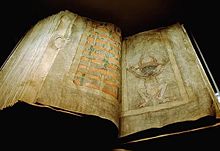Codex
Codex (බහුවචනය: codices (/ˈkɒdɪsiːz/) යනු වර්ථමාන පොතෙහි ආදීතමයා ලෙස සැලකිය හැක්කකි. වෙනස වන්නේ කඩදාසි වෙනුවට වෙලම්, පැපිරස්, හෝ වෙනත් ද්රව්යයක් පිටු ලෙස භාවිතා වීමයි. මෙම යෙදුම වර්ථමානයේ බහුලව භාවිතා වන්නේ පුරාණ අත් පිටපත් සඳහාය.[1]

නිරුක්තිය සහ මූලාරම්භය
සංස්කරණයCodex වදන බිඳී එන්නේ caudex නම් වන ලතින් වදනෙනි. එහි තේරුම "trunk of a tree", “block of wood” හෝ “book” යන්නයි. scroll වෙනුවට ඊලඟට භාවිතයට පැමිණියේ codex වේ. දැනට විනාශනොවී පවතින උදාහරණ වලට අනුව, පස්වන ශතවර්ෂය වනවිට ඊජිප්තුවේ codex වලට scroll අනුපාතය දහයට (10) එකකි (1). සයවන ශතවර්ෂය වනවිට scroll භාවිතය නැත්තටම නැතිවී ගොසින් ය.[2]
ඉතිහාසය
සංස්කරණයමෙම කොටස හිස්ය. එය පුළුල් කිරීමෙන් ඔබ හට උපකාර කළ හැක. |
ආශ්රිත
සංස්කරණයමූලාශ්ර
සංස්කරණය- ^ ඔක්ස්ෆර්ඩ් ඉංග්රීසි ශබ්දකෝෂය, 2nd ed.: Codex: "a manuscript volume"
- ^ Roberts, Colin H., and Skeat, T.C. (1987), The Birth of the Codex. London: Oxford University Press for the British Academy, p. 75.
භාහිර සබැඳි
සංස්කරණයcodex , යන්න නිදහස් ශබ්දකෝෂය වන වික්ෂනරිය දී සොයා බලන්න.
- Georgian Codex
- Centre for the History of the Book
- The Codex and Canon Consciousness – Draft paper by Robert Kraft on the change from scroll to codex
- The Construction of the Codex In Classic- and Postclassic-Period Maya Civilization Maya Codex and Paper Making
- Encyclopaedia Romana: "Scroll and codex"
- K.C. Hanson, Catalogue of New Testament Papyri & Codices 2nd—10th Centuries
- Medieval and Renaissance manuscripts, including Vulgates, Breviaries, Contracts, and Herbal Texts from 12 -17th century, Center for Digital Initiatives, University of Vermont Libraries